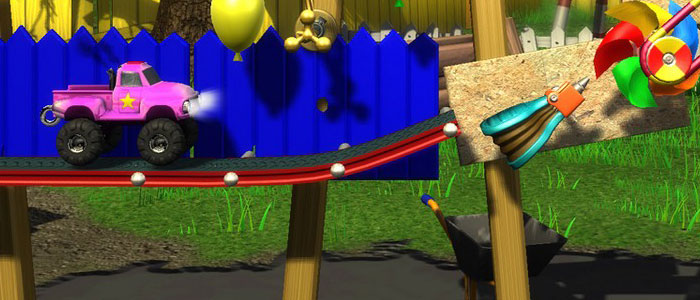[tab:Review]
Crazy Machines Elements arrives during the crazy end of summer rush for XBox Live Arcade, releasing alongside some hotly anticipated titles. The game is a physics-based puzzler that tasks you with completing a Rube Goldberg device in each level. Whether it’s making two mechanical mice “kiss” or getting an item into a shopping cart that begins all the way across the screen, the tasks are inane, but the solutions will drive you mad.
Crazy Machines has a history on the PC but loses something in its move to the XBox 360. Given that the solutions are entirely based on physics, careful placement of your limited inventory is key. Unfortunately, manipulating many of the items was an exercise in frustration. General movement of objects is handled with the left thumbstick and rotation is handled with left and right bumpers. I often had items jump much further than I wanted, which, at times, meant the difference between a solution and a near miss. In fact, there were times where two different runs of the machine with the same configuration produced results different enough that it impacted the outcome.

You can stop and start the machine with the Y button. Access inventory with the X button, zoom in and out with the triggers, pick up placed items with A and delete with B. It’s all very intuitive. Unfortunately, so are many of the solutions. The puzzles are set up such that there are gaps in the framework. Often, you just need to figure out the proper placement. Again, this is where frustration sets in, as it is often difficult to place an item exactly where it needs to be. It’s also fairly limiting. Rather than creative problem solving, it’s closer to putting a puzzle together. There’s nothing wrong with that if you know what you’re getting into, but the game tries to make you think you’ve got more flexibility than you actually have. The placement of the collectible golden nuts further guides the player toward the correct solution.
Thankfully, the other two modes of the game, which take a back seat to the 100-level puzzle mode, inspire deeper creativity. The Challenge Mode gives you very little to work with except a goal, a canvas and a budget. It’s up to you to place the 100 different materials and elements (wind, fire, etc.) in such a way to accomplish the task. Every person will approach these differently.
If that’s not enough for you, there is a creation mode that allows you to put your own machinations together. It didn’t seem clear to me that there was an easy way to set them up as challenges in the fashion of the core game. You can save your work, though, and return to show off your devious creations.

Graphically, the game tries very hard to display realistic textures like plastic, wood, metal, etc. Unfortunately, Little Big Planet does it much better and it’s hard not to compare and contrast the two. I often felt the game looked a bit fuzzy or blurry when zoomed out. It was, at times, difficult to discern specific actions while pulled out, but zooming in was too slow to allow me to follow as many things as I needed to pay attention to during a run.
On the audio side, the tunes and effects are lighthearted, but quickly wear thin due to redundancy. I found myself turning down the volume and skipping the end of level nut tally, especially because I didn’t want to hear the fanfare when I collected all of the nuts.
It’s not that Crazy Machines Elements is a bad game. There is absolutely enjoyment to be had, especially for fans of physics-based puzzlers. Unfortunately, this iteration of the series doesn’t make a great showing, largely due to its control problems and finicky nature. For the right audience, this is sure to be a hit, but those that aren’t diehard puzzle fans should definitely download the demo before making a purchase.
Review copy provided by publisher.
[tab:Screenshots]
[tab:END]
